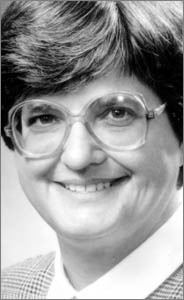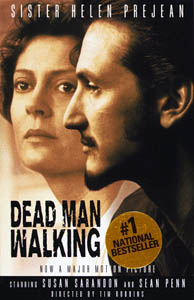![[MetroActive News&Issues]](/gifs/news468.gif)
[ Sonoma County | MetroActive Central | Archives ]
Last Rites
Capital punishment doesn't stand a ghost of a chance against Sister Helen Prejean
By Patrick Sullivan
I'M A STORYTELLER, a Southern storyteller to be exact," says Sister Helen Prejean, sounding just like one as her honey-smooth drawl slides down the phone line from New Orleans. "I'm just going to take the audience through the experiences I've had here in Louisiana, experiences with the people on death row and with murder victims' families and all the different folks involved with the death penalty."
Not exactly the words one might expect to hear coming out of a nun's mouth, maybe. But if anyone can weave gripping tales out of the grim facts surrounding one of America's hottest political controversies, it's Sister Prejean.
Over the past 16 years, the Roman Catholic nun from Louisiana--who will speak in Santa Rosa on Oct. 5--has repeatedly served as a spiritual adviser to death-row inmates. That work has brought her face-to-face with every aspect of America's dance with the death penalty, from the airy ideological conflicts of television debates to the hard-core reality of the electric chair and the needle at work.
Prejean, now 61, has personally witnessed five executions. Those experiences have helped transform her into one of America's most determined and effective opponents of capital punishment.
"It never gets easier to watch a human being who is fully alive be taken and killed in front of your eyes," she says. "You never get used to it. There's no way to get used to something like that, a death that doesn't have to happen.
"That's what galvanized me to work so hard, to get on planes and talk to people."
But she wasn't just talking. Prejean was also writing, and it's her writing that's had a major impact on the death penalty debate. Dead Man Walking, Prejean's 1993 account of her personal encounters with both death-row inmates and the families of their victims, garnered a nomination for the Pulitzer Prize and spent 31 weeks at the top of the New York Times bestseller list.
And that was just the beginning.
The book was like a stone thrown into a still pond, and the ripples are still spreading.
First, Dead Man Walking was made into an Oscar-winning movie in 1995. Directed by Tim Robbins and starring Susan Sarandon as Prejean and Sean Penn as a convicted killer facing death, the film version of Dead Man Walking pulled down four Academy Award nominations and helped reignite the debate over the death penalty.
Now the story has jumped genres again: in early October, an operatic version of Dead Man Walking opens at San Francisco Opera. Featuring opera's grande dame, acclaimed mezzo-soprano Frederica von Stade, as the death-row inmate's mother, the work is a collaboration between playwright Terrence McNally and composer Jake Heggie.
Prejean served as a consultant for both the movie and the opera--a job that took her into far different circles than her work in a housing project in New Orleans or her mission on death row. When Prejean attends the premiere of the opera, she'll be in the company of enough Hollywood luminaries to wear out a whole squadron of paparazzi.
"I was just talking to Susan Sarandon today, and all of them are going to be there," Prejean says. "She and Tim [Robbins] and the whole family are going to be there, and Sean Penn and Robin Wright. So it should be a really interesting experience."
It's a far cry from the sort of audiences Prejean encountered after the execution of Patrick Sonnier back in 1982 drove her to start speaking out on the death penalty.
"Who wants to hear a nun on the death penalty?" she asks. "Not many people. One talk I gave was at a nursing home here in New Orleans called St. Christopher's. Three people showed up after lunch. Two of 'em nodded plumb off during the talk, so I basically had one lady listening to me. And I mean, I locked onto her eyes, like, "Lady, don't you go to sleep too, 'cause then I'm talking to nobody.' "
And even fairly conservative politicians are listening. Shocked by a string of incidents in which condemned prisoners were found to be innocent, Republican Gov. George Ryan of Illinois declared in January a moratorium on capital punishment.
"All of these innocent people have come off death row by a fluke," Prejean says. "They've been saved at the last minute by journalism students or a DNA test, when the courts were just moving them along, ready to execute them.
"It's not that the system's working," she continued. "Scrappy citizens have gotten involved: Barry Scheck's Innocence Project, or the journalism students from Northwestern who saved Anthony Porter's life, or the filmmaker who did The Thin Blue Line and saved Randall Dale Adams.
"So that's helped till the soil on the issue."
But, of course, not everybody on death row is innocent, as Prejean conveys in her book. Her outrage at the crimes committed by the inmates she has counseled is clear, and her sympathy for the victims of these crimes and their families is profound.
Those emotions tend to confuse both sides in the death penalty debate.
But Prejean herself has little trouble reconciling opposition to crime with opposition to the death penalty.
"One of the things I've come to appreciate over the years is that it's very important to help people deal with the outrage that we all feel over crime," Prejean says. "Because we are outraged, and that outrage makes us feel like whoever did this deserves to die.
"And if we don't deal with those feelings," she continues, "then we can't come out the other end with a stance for life and human rights."
[ Sonoma County | MetroActive Central | Archives ]
Copyright © Metro Publishing Inc. Maintained by Boulevards New Media.
![]()
 Soul sister: Sister Helen Prejean, a Roman Catholic nun, first confronted her feelings about the death penalty in 1982 after becoming spiritual adviser to a condemned killer at Louisiana's Angola State Prison.
Soul sister: Sister Helen Prejean, a Roman Catholic nun, first confronted her feelings about the death penalty in 1982 after becoming spiritual adviser to a condemned killer at Louisiana's Angola State Prison.
 BUT PEOPLE these days seem far more ready to hear the downside of the death penalty. Indeed, opponents of capital punishment may never have the attention of so many ears. For the first time since the Supreme Court allowed the reintroduction of the death penalty in 1976, public opinion polls are showing growing opposition.
BUT PEOPLE these days seem far more ready to hear the downside of the death penalty. Indeed, opponents of capital punishment may never have the attention of so many ears. For the first time since the Supreme Court allowed the reintroduction of the death penalty in 1976, public opinion polls are showing growing opposition.
Prejean speaks and signs her book on Thursday, Oct. 5, at 7:30 p.m. at the Cardinal Newman Gym, 4300 Old Redwood Hwy., Santa Rosa. Tickets are $15 (proceeds benefit the Catholic Detention Ministry). For details, call 578-0304.
From the September 28-October 4, 2000 issue of the Sonoma County Independent.